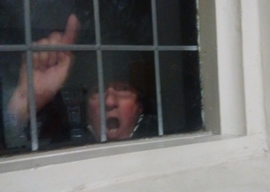
December 02, 2017

Source: Mrs. Dalrymple
Last week, I spoke at a writers’ festival and there was a demonstration against the following speaker who was known for her sulfurous views. The demonstration was expected, in fact it had been announced beforehand. Its intention was to prevent the author from speaking, and in the end it succeeded in this aim. She left without delivering her talk.
The shouting outside and banging on the windows started before I had finished my own talk, though it was not directed at me. The eggs, too, began to arrive, proving that, while you can’t make an omelet without breaking eggs, you can break eggs without making an omelet. The demonstration was against hate speech, but the faces pressed against the windows of the venue from outside seemed hardly to express human affection. My wife, who was with me, took a wonderful photograph of one of them.
I had not heard such chanting since I witnessed a small rally of elderly Italian fascists in Naples, addressed in a confined space by Alessandra Mussolini, granddaughter of the late Benito. There were only about 400 present—mainly old, embittered and crippled, it seemed to me—but all the same, hearing them chant Duce! Duce! Duce! in unison while making the fascist salute was quite frightening, although la Mussolini was an unconvincing reincarnation. (I don’t think there is a female form of Duce, and as far as I am aware, no one has protested at this manifestation of patriarchal hegemonic language, though this may yet change.)
Anyhow, it is surprising how quickly a demonstration against alleged fascism turns into something strongly resembling fascism. And as everyone knows—or would know, if he looked into his own heart—there is nothing as pleasurable as throwing eggs in a good cause.
I don’t attend many literary events, not out of principle but because I am not invited; but this was the first that I have attended that had not only a police presence but bouncers (or greeters, as they subsequently became known in these politically correct times). I confess that I felt a slight pang of envy at the passion evidently roused by the speaker following me: No one has ever cared that much about what I write. I was reminded of what the Russian poet Osip Mandelstam said about Russia being the only country that really cared about poetry, because they shot poets there.
Anyway, we had to vacate the hall by a side entrance unnoticed by the demonstrators, under cover of darkness and with the police, who had done little to quell incipient violence, and who seemed to have accepted being pelted with eggs passively if not with equanimity, in attendance. As it happened, the path was through a graveyard, and one of our number twisted his ankle in the escape. It was all quite exciting. I hadn’t had to leave a public building by the rear exit like a thief in the night since I was ushered out of the rear of a coroner’s court after appearing in a case in which a mother accused me of having killed her son (he killed himself). Since her family was of the kind that expressed its grief—as every other emotion—in a rather physical way, the court usher thought it might be as well for me to sneak out the back way.
The bouncers were large men dressed in black suits and ties with earphones plugged into their ears. They were about eight feet wide. I don’t remember anybody built like that when I was a boy, but perhaps that was because I never went anywhere like literary festivals that needed bouncers. On the assumption that they didn’t exist, the question naturally arises as to whether supply created demand or demand created supply?
I don’t think anyone is a natural-born bouncer. In other words, as literary academics and sociologists would no doubt put it, bouncers are socially constructed rather than natural phenomena. A lot of testosterone goes into the making of bouncers, though whether endogenous or exogenous (as we doctors put it) is yet another question.